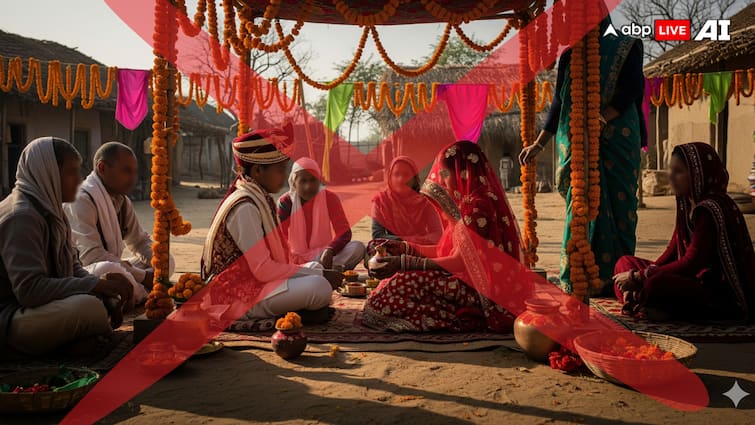— By Jitendra Parmar
They say a good teacher shapes your mind. But sometimes, a good teacher does more than that. They can change the course of your entire life. On this Teachers’ Day, we celebrate a few such remarkable educators who went far beyond the classroom. They didn’t just teach their students the difference between right and wrong; they stood beside them in their darkest moments, shielding them from being pushed into a crime as grave as child marriage.
These teachers, from the Birbhum district of West Bengal, have challenged not just parents but entire communities and their age-old beliefs. In a district where one in every two girls is being pushed into child marriage even today, the task has been dangerous, urgent and much needed.
An Anonymous Note for ‘HELP’
Every evening when the students of a girls’ school in Birbhum district head home, the school’s assistant headmistress, along with other teachers, checks the drop box they have named ‘Pran Khule, Mon Khule‘, which literally means ‘Open Soul, Open Heart’. This is where girls often write their problems and share the challenges they cannot confide in otherwise.
Sometimes the matters could be as routine as a mathematics phobia, but then for some girls, this drop box becomes their voice, and the teachers their saviour. Sometimes they’re the only saviours.
But August 5, 2025, was different.
“When we opened the drop box that day, it had a note. No name, no mention of the class, nothing. All it said was ‘Ma’am, please help me. My parents are getting me married,” recalls Arpita Bandyopadhyay, assistant headmistress.
Since the note provided no clue, she decided to ask other teachers if anyone had any idea about a child in distress. One teacher immediately remembered that one of her Class X students, Salma (name changed), had recently mentioned that her parents want her to get married to her maternal cousin.
“We immediately fetched Salma’s notebook and compared her handwriting with the one in the note. They matched,” she said.
The next morning, the two teachers went to Salma and asked her very warmly if she had written the note. Salma lowered her head and nodded a “Yes”.
“She told us that her parents were planning to get her married to her cousin very soon. She told us she wanted to finish her studies and feared marriage would end her dreams,” recalls Arpita.
So the school immediately got in touch with the members of NGO Elmhirst Institute of Community Studies, who often visited the school to generate awareness about child marriage. Notably, Elmhurst Institute is one of 250 NGOs of Just Rights for Children, India’s largest NGO network working for child protection.
As soon as the NGO was informed about Salma’s case, they alerted the Child Development Project Officer and the police about the impending child marriage. A team, including the NGO member, CDPO and the police, met with Salma’s parents and counselled them. The parents were informed that if Salma were married before 18, the parents could go to jail and be fined as per Indian laws. The parents signed an undertaking and promised to let Salma study and not get married.
“Salma was always a bright child, but since this incident, her zeal to become somebody and make a future for herself has increased multi-fold. Our students are vulnerable and are often pushed into child marriage. So, we as teachers ensure that they know that they are not alone and we will help them whenever they are faced with such challenges,” Bandyopadhyay said.
Headmaster’s Office The Last Resort For This Student
The Headmaster’s office in a school is often the place children are seldom willing to enter. But for Sampa and Nandini (names changed), the headmaster’s office in their school in Bolpur was their last resort. They knew that if they didn’t talk to him, Sampa’s life would be ruined forever.
Sampa, a 14-year-old child studying in Class IX, was getting married in two days. She had cried, stopped eating, pleaded with her parents, but nothing she did or said was able to change her parents’ decision. So she confided in her best friend, Nandini, who suggested that they meet the headmaster and apprise him of the situation.
“Ami jaani, uni aamader kotha shunben (I know, he will listen to us),” Nandini assured her as she held her hand.
On August 3, 2025, the duo, with apprehension, knocked on the headmaster’s door and entered.
While Sampa stayed quiet, her hands trembling, her friend started speaking. “Sir, Sampa is getting married in 2 days. Please help her.” She then nudged Sampa and signalled her to speak.
Sampa, extremely terrified that her parents would get to know about this, talked to him almost in whispers and shared her ordeal. She then said, “Sir, please don’t tell anyone that I told you about this.”
The headmaster promised her that no one would know her identity, but she would be saved. He then called a Community Social Worker of the Elmhirst Institute of Community Studies, and explained the urgency of the situation.
“As soon as he informed us, we called up the child and promised her that her identity would not be disclosed. Then we contacted the local police and administration,” said Priyam Mukherjee, Director, Elmhurst Institute.
A team comprising CSW and other members of the NGO, along with Police officials, met with Sampa’s parents and counselled them. They eventually signed an undertaking promising that they wouldn’t get their daughter married till she turns 18.
“Often, the parents in these villages are unaware that child marriage is a crime. This practice is so deeply embedded in the community that they are often shocked when we explain the legal consequences of this crime against children. But with the support of law enforcement agencies and administration, we are slowly but surely bringing in the changes,” said Priyam Mukherjee.
It must be noted here that while West Bengal remains at the top with the highest prevalence of child marriage in the state at 41.6 per cent as against the national average of 23.3 per cent, the situation of child marriage is much worse in Birbhum district at 49.9 per cent, as per the National Health Family Survey V (2019-21).
In a district where almost every second girl risks being pushed into marriage, teachers like Arpita and the headmaster remind us why education is not just about textbooks, but it is about courage, protection, and rewriting futures.
(The author is a member of Just Rights for Children, a network of NGOs that works against child marriage, child sexual abuse, child trafficking and child labour.)
[Disclaimer: The opinions, beliefs, views, and information expressed by the various authors and forum participants on this website are personal and do not reflect the opinions, beliefs, and views of ABP News Network Pvt Ltd.]



